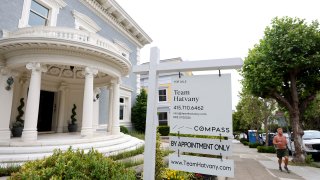
- Home sales inched higher in May from April, according to the National Association of Realtors.
- High interest rates, inflated prices and tight supply are weighing on the traditionally busy spring market.
- Compared with a year earlier, sales fell more than 20%.
Sales of previously owned homes were essentially flat in May compared with April, according to the National Association of Realtors.
They rose 0.2% to a seasonally adjusted, annualized pace of 4.30 million units. Compared with a year earlier, however, sales were 20.4% lower.
The slow spring sales pace is a combination of still-high prices, elevated mortgage rates and a critical shortage of homes for sale.
There were just 1.08 million homes on the market at the end of May. That's 6.1% lower than the supply in May of last year. At the current sales pace that represents a three-month supply. Six months is considered a balanced market. Before the Covid pandemic hit, there were nearly twice as many homes on the market.
"Newly constructed homes are selling at a pace reminiscent of pre-pandemic times because of abundant inventory in that sector," Lawrence Yun, chief economist for the NAR, said in a release. "However, existing-home sales activity is down sizably due to the current supply being roughly half the level of 2019."
May sales are based on closings – that is, homes that likely went under contract in March and April. Mortgage rates were choppy during that period. The average contract interest rate on the popular 30-year fixed mortgage started March over 7%, then dropped sharply close to 6% briefly before then heading higher again, spending most of April around 6.5%.
Money Report
Strong demand has kept a floor under home prices, which would normally drop more given the slow sales pace. The median price of an existing home sold in May was $396,100, which is 3.1% lower than May 2022. Prices rose in the Northeast and Midwest but fell in the South and West.
This is the largest price drop in just over a decade, but it is a median measure, which skews the price toward the type of home that is selling the most.
Right now, lower-priced homes are seeing the most activity. While sales of homes in all price tiers are now lower compared with a year ago, sales of homes priced between $250,000 and $500,000 were down 12%. But sales of homes priced between $750,000 and $1 million were down 21%. Other price indexes that measure repeat sales of similar homes are showing prices rising again.
The pull between strong demand and tight supply is keeping the market competitive. Nearly a third of properties sold above list price. Properties remained on the market for 18 days in May, down from 22 days in April but up from 16 days in May 2022. Nearly three-quarters of the homes sold in May were on the market for less than a month.
"With fewer homeowners poised to become sellers in 2023, buyers have a tough road ahead," said Danielle Hale, chief economist for Realtor.com. "Our revised 2023 outlook expects that there will be some positives, namely, a gradual decline in mortgage rates beginning midyear and a continued softness in home prices that will start to stabilize high housing costs."
The start of the summer housing season is shaping up much like the spring, with slower sales due to lack of supply. In a separate report from Redfin, a real estate brokerage, pending home sales fell 16% from a year earlier during the four weeks ended June 18. Pending sales are based on signed contracts, not closings.
Despite slower sales, Redfin's measure of requests for tours and other early stage buying services is up 11% year over year. There are simply more buyers than homes for sale, as new listings are down 24% from a year ago, and the total number of homes for sale is down 8%, the biggest drop in over a year.






